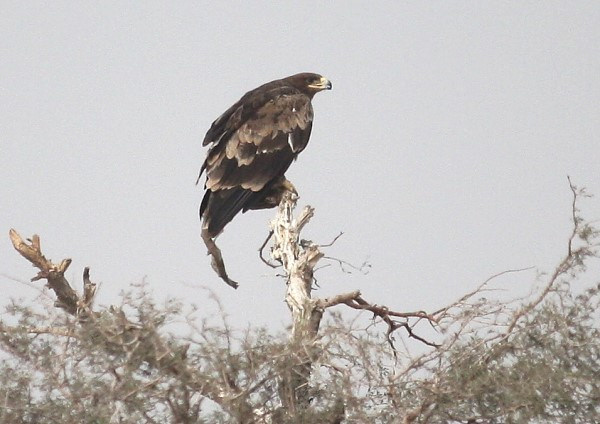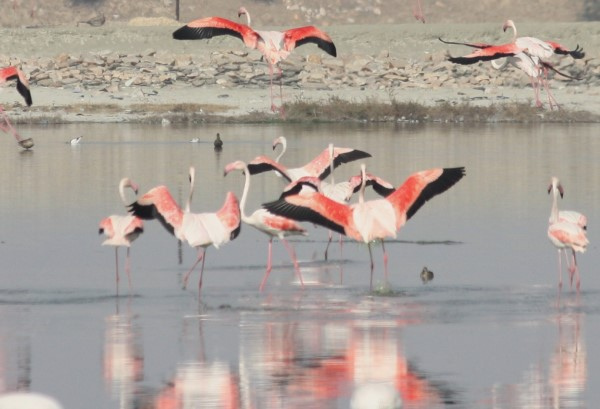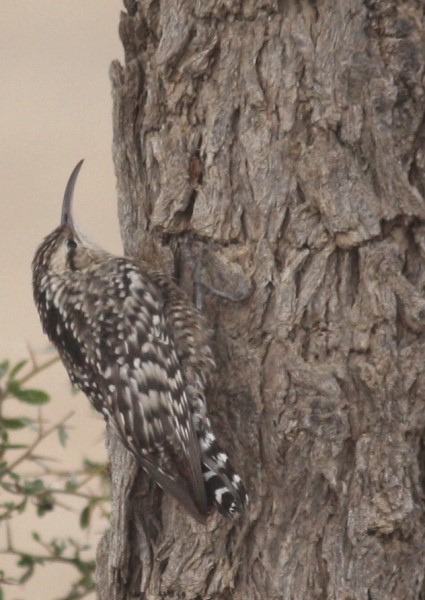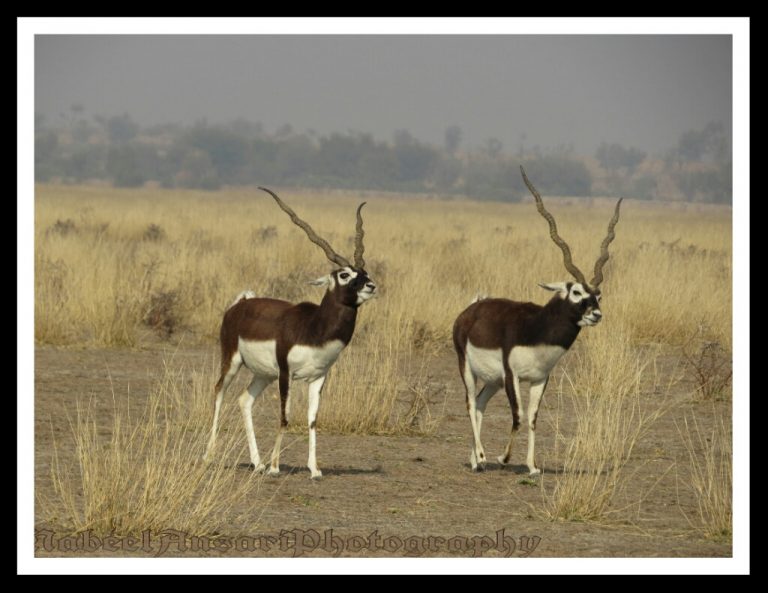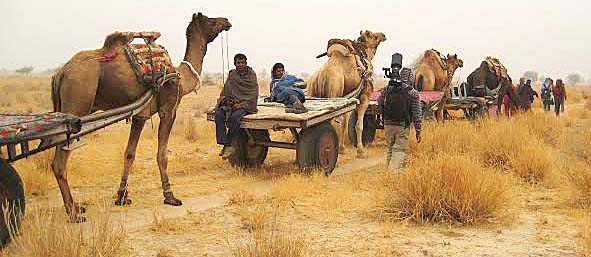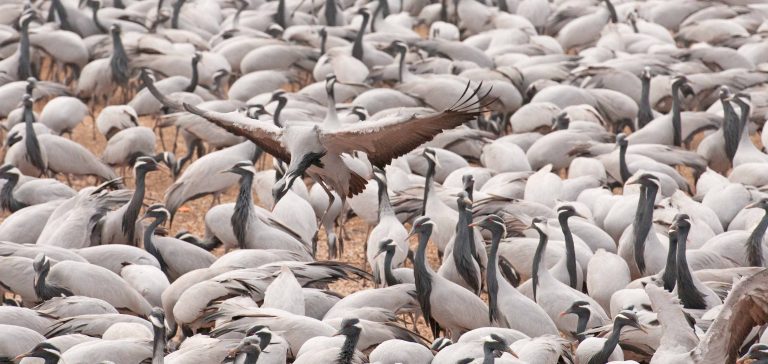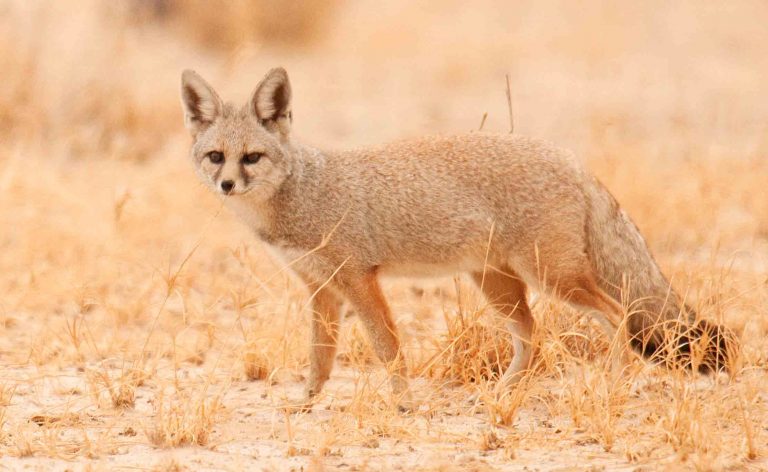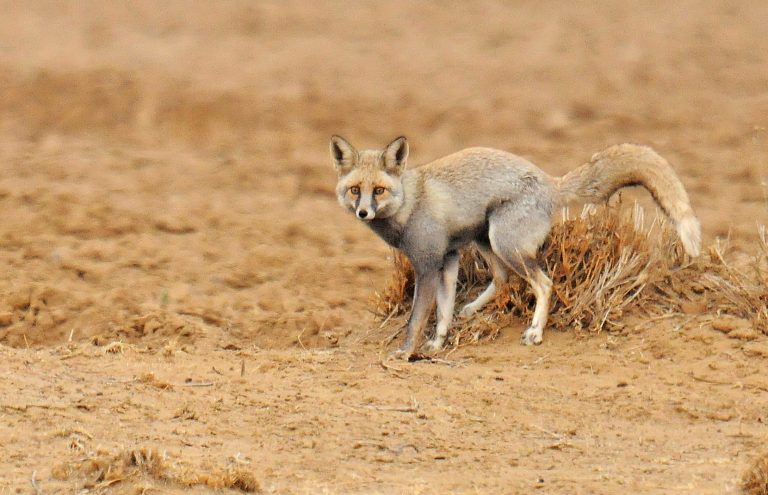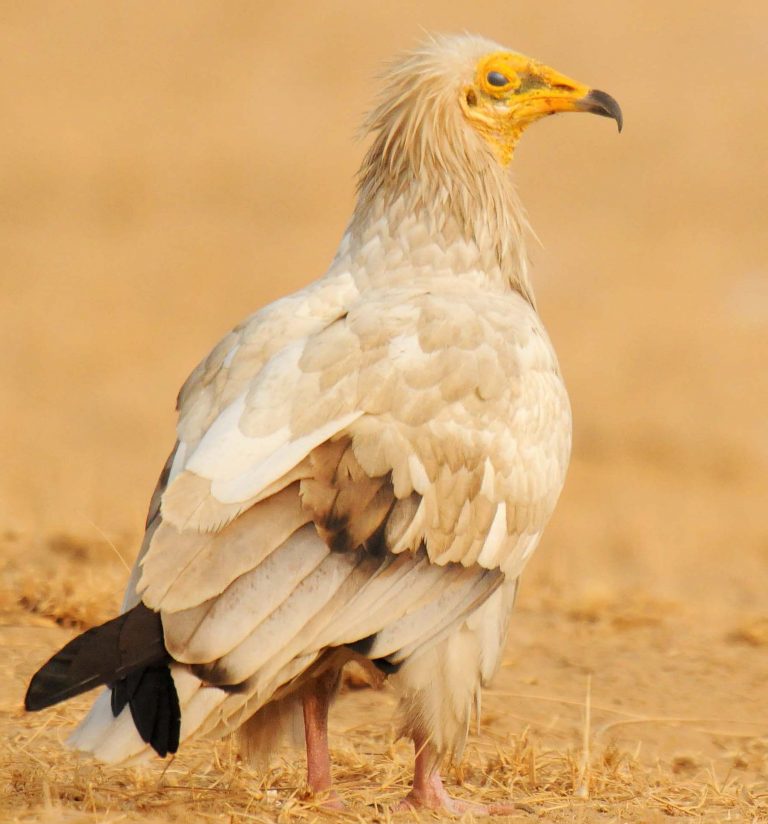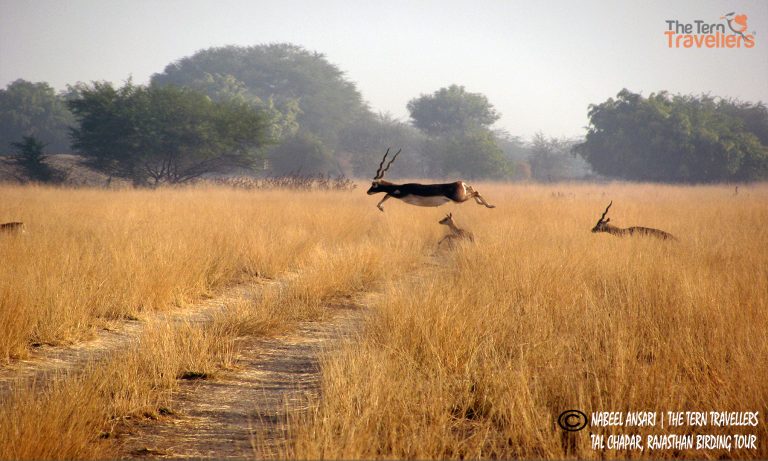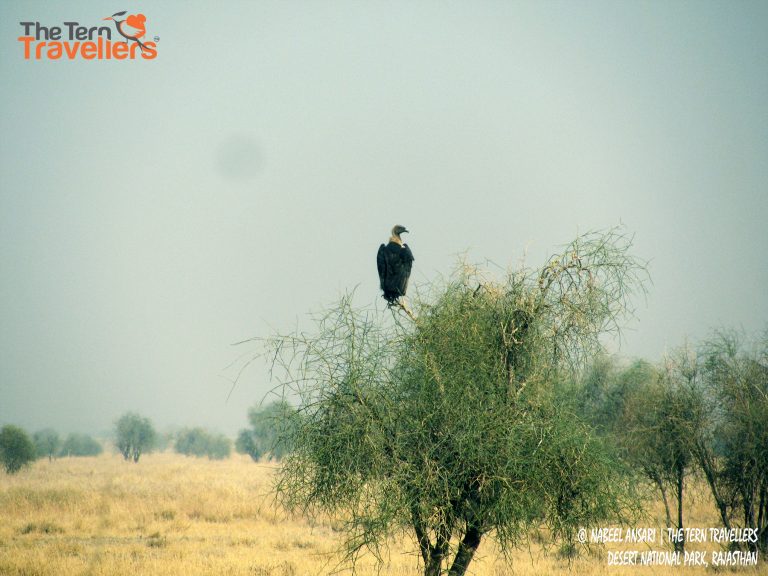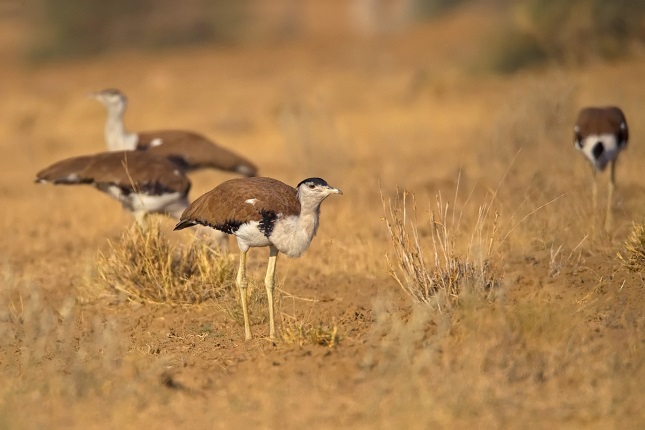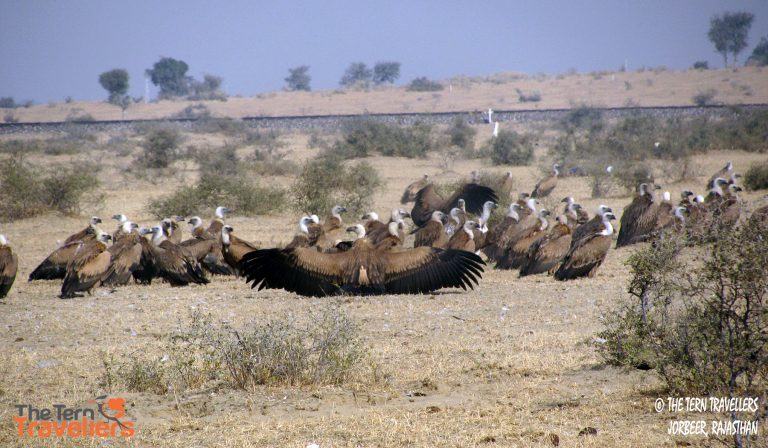- Overview
- Trip Outline
- Trip Includes
- Trip Excludes
- Important note
- Things to carry
- Cancellation Policy
- Booking
- Gallery
Wilderness of Thar – Tal Chapar, jorbeed, kheechan, desert national park
6 NIGHTS - 7 DAYS
The Wild Rajasthan Birding Circuit is one of India’s finest and most productive bird photography tours, specially curated for international birders and wildlife photographers seeking desert specialties, migratory spectacles, and rare species in dramatic landscapes 🦅📸.
Covering the heart of Rajasthan’s desert ecosystem, this circuit connects wetlands, grasslands, carcass dumps, salt lakes, and arid national parks, offering exceptional diversity within a single, well-paced itinerary.
🛣️ Route & Birding Highlights
Jaipur → Naliasar Lake → Sambhar Lake → Tal Chapar (2N) → Jorbeer → Kheechan (1N) → Jaisalmer & Desert National Park (3N)
-
Naliasar & Sambhar Lake 🦩 – Winter spectacles of Greater & Lesser Flamingos, avocets, stilts, pelicans, gulls, and vast migratory waterbird congregations.
-
Tal Chapar Grasslands 🌾 – One of India’s best grassland birding sites, famous for Harriers, Demoiselle Cranes, Spotted Creeper, Black-crowned Sparrow-Lark, Desert Wheatears, and raptors.
-
Jorbeer (Bikaner) 🦅 – World-renowned raptor hotspot with Egyptian Vultures, Steppe Eagles, Laggar Falcons, and dramatic scavenger action.
-
Kheechan Village 🐦 – Iconic wintering site of Demoiselle Cranes, offering close, ethical photographic opportunities.
-
Desert National Park & Jaisalmer 🏜️ – Home of the legendary Great Indian Bustard, Cream-colored Courser, Desert Eagle Owl, Macqueen’s Bustard, sandgrouse, and larks.
This circuit is designed with ample time at each site, optimal light conditions, and flexible schedules—crucial for serious bird photography.
⭐ Why Visit This Circuit?
-
One of India’s best winter birding routes 🌍
-
Exceptional raptor & desert specialist diversity 🦅
-
High photographic success with ethical access 📸
-
Perfect mix of wetlands, grasslands & desert habitats
-
Ideal for foreign birders & photographers visiting India
📦 What’s Included
-
Expert birding guide with global birding experience 🧭
-
Carefully selected birding-friendly stays 🏨
-
All ground transport & site logistics 🚙
-
Field support for photography & species identification 📷
-
Local guides at key birding hotspots
👨👩👧 Ideal For
-
International bird photographers 🌍📸
-
Serious birders & listers
-
Small private birding groups
-
Wildlife tour operators & researchers
🌱 Eco Practices
-
Ethical bird photography guidelines 🐦
-
Community-supported conservation sites 🤝
-
Minimal disturbance birding protocols
-
Plastic-free & responsible travel ethos ♻️
📌 Quick Facts
-
📍 Region: Rajasthan, India
-
🗓 Best Season: December – February
-
🐦 Key Species: Flamingos, Demoiselle Cranes, Raptors, Bustards
-
📸 Photography: Excellent (action + habitat shots)
-
🏜️ Habitats: Wetlands, grasslands, desert, salt lakes
Tal chapar:
Tal Chhapar Sanctuary is a sanctuary located in the Churu district of North-western Rajasthan in the Shekhawati region of India. It is known for blackbucks and is also home to a variety of birds. The sanctuary is 210 km from Jaipur on the fringe of the Great Indian Desert and situated on road from Ratangarh to Sujangarh. The Tal Chhapar sanctuary lies in the Sujangarh Tehsil of Churu District. The sanctuary area is mostly covered by grasses with a very few trees. It lies on the passageway of many migratory birds such as harriers. These birds pass through this area during September. Birds commonly seen in the sanctuary are harriers, eastern imperial eagle, tawny eagle, short-toed eagle, sparrow, and little green bee-eaters, black ibis and demoiselle cranes, which stay till March. Skylarks, crested larks, ring doves, and brown doves are seen throughout the year. Desert fox and desert cat can also be spotted along with typical avifauna such as partridge and sand grouse.
Kheechan:
Khichan is a village in Rajasthan state of India. It is located in the Phalodi tehsil of Jodhpur district. The village is known for a large number of demoiselle cranes that visit it every winter. This annual bird migration began with around a hundred cranes in the 1970s, when a local couple started feeding pigeons. Other villagers joined their efforts, and as of 2014, Khichan now hosts over 20,000 demoiselle cranes from as early as August each year to as late as March of the following year.
desert national park:
Desert National Park, Rajasthan, India, is situated in the West Indian state of Rajasthan near the town of Jaisalmer. This is one of the largest national parks, covering an area of 3162 km². The Desert National Park is an excellent example of the ecosystem of the Thar Desert. Sand dunes form around 20% of the Park. The major landform consists of craggy rocks and compact salt lake bottoms, intermedial areas and fixed dunes.
Perhaps the greatest attraction of the park is a bird called the great Indian bustard, an endangered species found only in India. The region is a haven for migratory and resident birds of the desert. Many eagles, harriers, falcons, buzzards, kestrel and vultures. Short-toed eagles, tawny eagles, spotted eagles, laggar falcons and kestrels are the most common among these. The endangered great Indian bustard is a magnificent bird found in relatively fair numbers. The Desert National Park has a collection of fossils of animals and plants of 180 million years old. Some fossils of dinosaurs of 6 million years old have been found in the area.
|
Day |
Itinerary |
Stay |
Meals |
|
Day 1 |
Jaipur – Naliasar – Sambhar – Tal Chapar |
Home stay |
L,D |
|
Day 2 |
Tal Chapar – Gau Shala – Tal Chapar |
Home Stay |
B,L,D |
|
Day 3 |
Tal Chapar – Jorbeer – Kheechan – Phalodi |
Hotel |
B,L,D |
|
Day 4 |
Phalodi – Kheechan – Jaisalmer – Sam |
Swiss Tent Resort |
B,L,D |
|
Day 5 |
Desert National Park – Gajaimata sand dunes |
Swiss Tent Resort |
B,L,D |
|
Day 6 |
Desert National Park – Jaisalmer – Desert National Park |
Swiss Tent Resort |
B,L,D |
|
Day 7 |
DNP – Jaisalmer – Jodhpur |
|
B,L |
Itineraries
Day 1
Jaipur – Naliasar – Sambar Lake – Tal Chapar
Arrive at Jaipur railway station by 0800Hrs and meet The Tern Travellers leaders and transfer to Tal chapar via Naliasar & Sambhar. We halt for Birding around the Naliasar and Sambhar Lake. Head for lunch on way some local delicacies of Rajasthan in a proper restaurant. Drive to Tal Chapar and check in. Freshen up and rest for a while. If time permits we shall have one safari in Tal Chapar Blackbuck sanctuary. Returning back in the evening we shall have dinner in a local villa of Chapar and homely cooked food will be served for dinner. We call it off a day early.
Day 2
Tal Chapar – Gau Shala – Tal Chapar
Early chilling mornings with quick breakfast we shall head for safari no. 2, explore the grasslands of Tal Chapar. Drive to Gau shala in search of the rare species Spotted creeper and Eurasian Wryneck and also Spiny tailed lizards. Head for Lunch and drive to Tal chapar sanctuary again for a final safari in the grasslands. The mighty blackbucks and raptors can make your day, photographing them. Dinner will be served early and drive back to hotel.
Day 3
Tal Chapar – Jorbeer – Kheechan – Phalodi
Another chilling morning, have an early breakfast and drive to Jorbeer (A Caracas dump). It is a paradise for Raptors, with species like Egyptian Vulture, Cinereous vulture, Long Billed Vulture, White rumped Vulture, Indian Griffon, Himalayan Griffon, King Vulture, Steppe Eagle, Indian Spotted Eagle, Tawny Eagle, Black Eagle, Serpent Eagle, Bonelli’s Eagle and the rare of all Yellow eyed pigeon. Reach Jorbeer Vulture Conservation centre, explore the place and photograph. (Be ready for the strong stench and beware of the dogs). Lunch in Bikaner and drive straight to Kheechan for an evening stroll of the Demoiselle crane. Check In to hotel and rest for the day. Dinner will be served and call it off a day.
Day 4
Phalodi – Kheechan – Jaisalmer – Sam
Wake up early for a quick breakfast and check out from the hotel. Drive to Chugga Ghar – A feeding ground for these winter migrants. This tradition has been running since decades and generations. There is a proper record of every day’s arrival and departure of these flocks of birds. A cup of tea with knowledge of feeder who has been awarded by international bodies in wildlife. You can actually photograph the bird’s right above your heads and that too in huge flocks. The synchronization of flocks is a stunning view. After we finish photographing the birds, we drive straight to Sam via Jaisalmer. Check in to the campsite and have Lunch. Evening we head for Camel Cart safari in Desert National Park. Looking for Great Indian Bustard and other rare birds. Return to campsite, have dinner and call it off a day.
Day 5
Desert National Park – Gajaimata Sand dunes – Sam
It’s going to be cold and chilling early morning and a hot cup of tea shall make you warm. Drive straight to DNP main gate and move for our second Camel Cart Desert Safari. Return for lunch and drive to Gajaimata Sand Dunes where we look for foxes and also the Golden light. Photographing the dunes against the Golden light is a memory in itself. Drive back to Camp and post dinner call it off a day.
Day 6
Desert National Park – Jaisalmer – Sam Dunes – Sam
This day would be leisure as we drive through the some historic places of Jaisalmer and abandoned village of Kuldhara (apparently haunted and abandoned). Visiting the Fort of Jaisalmer (which is a live in Fort), palaces and finally the dunes of Sam. You can experience Jeep Dune safari or Camel rides in the dunes (On own). Lunch will be served in a traditional Jaisalmeri restaurant with local cuisines in the traditional way. Drive back in evening to camp and post dinner, call it off a day. You can enjoy traditional dance around the bon fire before and after dinner.
Day 7
DNP – Jaisalmer – Jodhpur
A lazy breakfast and we checkout from camp, drive straight to Jodhpur. Lunch will be served en-route. We should reach Jodhpur by 4 in the evening and wave off as we disperse and promise to meet again on some adventurous journey. Trip ends with new travel friends, memories and loads of Photographs.
Tour officially ends here.
- Return 3 tier AC train ticket from Mumbai (Ex Mumbai option)**
- Accommodation on twin sharing basis
- Ground Transportation & birding by AC SUV Vehicle.
- Meals as per mentioned in the itinerary.
- 2 Safaris in Tal Chapar
- 2 Safaris in Desert National Park
- 1 Camel Safari in Gajaimata Sand Dunes
- Excursion to Jaisalmer and Sam Dunes
- Bird watching @ Tal chapar, Jorbeer, Kheechan, Naliasar, Sambar Lake
- Safari charges, forest permits, guide charges.
- Professional Wildlife Naturalist host of the tour
- GST 5%
- Convenience fee
- Additional / personal use of vehicle.
- Extended stay due to weather conditions or any situation not in human control.
- Any personal expenses, room service and special orders, mineral waters, non-alcoholic beverages, tips, phone calls, laundry etc.
- Any extra excursions or sightseeing apart from the above specified itinerary.
- Cost incidental to any change in the itinerary due to bad weather, ill health, roadblocks and/or any factors beyond control.
- Camera fees.
- Adventure sports at the property.
- Airfares/Rail fare. (Ex Jaipur option)**
- Anything Specifically NOT mentioned in includes.
- Wildlife safaris/Bird watching is a matter of luck and opportunity. No guarantee of any sighting is made. Neither of our associates will quote that, although we try our best to spot and show you as much as nature allows us to.
- Birdwatching is a hobby and not a race, hence request all birders to maintain discipline at all times.
- Bird watching is an art of silence and key observation.
- Avoid Pointing out directly to a bird that might flush the bird away.
- Do not get too close to a bird for a photograph that you flush it away.
- Birdwatching should be enjoyed by binoculars and the fun is to spot them, identify them and if you still have some time with the bird photograph them.
- Never enter the forest with an intention of spotting a single species, it will only disappoint you. The forest is a gift packet with a lot to surprise with. Listen to our naturalist for more wonderful experience.
- Our walks are not target species specific (Unless specified)
- We explore everything we find uncommon and need to be explained.
- Any demand for spotting a single species in any jeep will not be entertained by the guide or the tour leader as there are other travellers who would want to see the birds etc.
- Respect & honour everything that is in the forest and it has to offer you.
- Enjoy being in the forest and you will feel much happier away from the concrete chaos.
- Respect the local, tribes, guards, guides, drivers, officers and all animals.
- Front seat of the Gypsy is always reserved for the Guide or Guard.
- No extra room will be made for photographers, respecting other travellers. (For photographers it is recommended to opt for higher options)
- No littering in the forest strictly. (what goes comes back the same way)
- Camera fees & guide tips to be paid separately & directly.
- Kindly follow the instructions given by the tour leader and the guide for your own safety.
- A Hat
- Sunglasses with UV protection
- A dust protection mask
- Personal Bottle (To avoid plastic use – 1LtrsX2)
- A haversack (60-70 Ltrs)
- Small backpack (10Ltrs)
- Field books
- Sun screen
- Only dull coloured clothes (Green, brown, Beige, Camouflage)
- Camera (At owners risk) with proper equipment for photography (As per need)
- Fleece/Jacket (temperatures drop in the forest to below 10 degree Celsius)
- Winter wears (The Himalayan/Desert range drops temperature rapidly in the evening)
- Binoculars
- Energy bars
|
Cancellation period |
Cancellation Charges on Cost |
|
More than 30 days |
25% |
|
30 to 21 days |
50% |
|
21 to 14 days |
80% |
|
Less than 14 days or No show |
100% |



